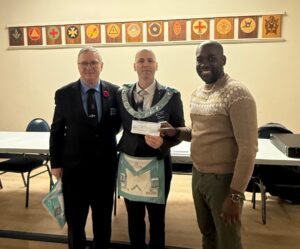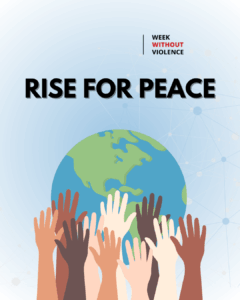I was 15 when the Montreal massacre happened. It changed how I see the world. – Jana G. Pruden
Jana G. Pruden is a feature writer for The Globe and Mail and host of the podcast In Her Defence. The following is an excerpt from a keynote speech delivered to YWCA Edmonton on Dec. 5 as part of The Rose Campaign to help end violence against women and girls.
The clock on the wall had just ticked past 5:10 p.m.
It was Dec. 6, 1989. Eric Chavarie was at the front of the room, giving a presentation about heat transfer. There were about 60 students in the classroom, the last day of classes before exams. It was a cold day in Montreal. So cold it had broken records. A bitter, painful cold people would remember years later, part of the memory of the day.
A man walked into the classroom. He was young, with curly hair. He was wearing work boots and blue jeans, with a white baseball cap and a hunting jacket.
And when he walked in, he was smiling. One person would later describe him as a madman who wasn’t mad. So calm that people at first thought it was some kind of joke. Even with the gun.
He said: “Everybody stop everything.”
He fired one shot at the ceiling. And he told the class to separate into two groups, men on one side, women on the other. There were, it should be said, far more men in the class than women. Less than 20 per cent of the students at L’Ecole Polytechnique were female.
There were about 50 men in the room, and a dozen or so women. They didn’t know why they were being separated. One of the men in the class said he initially thought it was the men who were going to be killed.
But when the class was divided, the shooter let the men go.
And they went. “We just ran for our lives,” that young man later told a reporter. They ran away down the hallway. Leaving the women – their friends, their girlfriends, their classmates – alone to face the man with the gun.
The man with the gun asked: “Why should women be engineers and not men?
He said, “You are all feminists.”
Nathalie Provost was one of the students in that room, and she stood up to him. She spoke to him before he started shooting, pleading with him. She told him the women weren’t feminists. She said, “We are only women who are studying engineering.”
He started shooting while she was talking.
He killed six women in that classroom, and injured three others, including Ms. Provost. By the time it was all over, 14 women had been killed. Another 10 women and four men were injured. Then he shot himself.
I’m not naming the shooter. In some ways, his name doesn’t matter. As Asmaa Mansour, one of the women who survived the attack, described him once, “He is every man who hates a woman.”
The Montreal massacre was the largest mass shooting in Canadian history, and remained so for almost 30 years, until a man in Portapique, N.S., with a long history of domestic violence went on a rampage after nearly killing his spouse. Misogyny was at the root of that violence, too. There is a strong, documented connection between intimate partner violence and mass shootings.
I was 15 years old when the Montreal massacre happened. For myself, and for many women and girls, it changed how we saw and understood the world.
I didn’t call myself a feminist then, or for many years after. Feminist was a dirty word. Militant feminist definitely was. To be a feminist meant to be a man-hater. To be unreasonable and difficult and demanding. A scold, humourless and unreasonable.
In those days, I thought women were already equal, and that I could be whatever I wanted to be, and do whatever I wanted to do. I didn’t pay too much attention to all the things that indicated otherwise. Or perhaps I didn’t think I was allowed to be upset by them.
Nathalie Provost, the woman who pleaded for all their lives in the classroom that day, has said she didn’t think of herself as a feminist then either.
She thought that feminism was for women of her mother and grandmothers’ generations, the women who fought for the right to vote, to work wherever they wanted, to make choices about their own bodies.
By the time Ms. Provost sat in that classroom at Polytechnique on that cold winter day, she thought those battles were no longer necessary. She thought women’s rights were secure. Women could be engineers. She was going to be one of them.
“What I know today, which I didn’t know 25 years ago, is how fragile all that is,” she said, during an interview in 2014. “We can’t take it for granted.”
She wasn’t the only one who didn’t want to say the f-word. The Montreal massacre wasn’t formally recognized as a femicide until 2019.
I’ve now been a reporter for more than 25 years, much of it spent covering court and crime. And I see things a lot differently now, too. In my work, I’ve covered far more sexual assaults, physical attacks and domestic homicides of women than I can count.
In my own life, I’ve seen the deep harm caused to women I know and love by sexual assault, by domestic abuse, by sexual harassment, by inequity in the workplace, by failings in access to reproductive rights and other health care. And so much more.
And I’ve found myself talking about misogyny and the patriarchy and systemic bias, and the way that hurts individual women. Exactly the kinds of things a feminist would say.
The Montreal shooter wrote in his suicide note that he was going to kill “the feminists who have always ruined my life.” He said feminists wanted to keep the advantages of being women, while also trying to take those of men. He had listed another 19 women he wanted to kill, all of whom he considered to be “radical feminists.”
I’ve read a lot about the Montreal massacre through the years. There is so much to be haunted by. The police officer who found his own daughter’s body. The way survivors remembered the sound of the bullets hitting concrete. The carnage. The smell of blood.
But I’m also haunted by the thought of all those young men running away down the hall, leaving the women alone with the gunman. Leaving the women to certain death.
The threat was not against them, and so they saved themselves.
Richard Aube, who was head of security at the school, once speculated there was an opportunity to intervene when the shooter’s gun jammed. “But no one did.”
I don’t blame them. It’s impossible to say what we would do in such a situation. The instinct to protect oneself is strong. And those were young men, who were shocked and scared, too.
Sarto Blais, one of the men who survived the shooting, hanged himself in the bathroom of his apartment eight months later. His uncle said he left a suicide note saying he couldn’t accept that as a man, he’d been there and hadn’t done anything about it. A year later, his parents killed themselves, too, having lost their only son. Tragedy upon tragedy upon tragedy.
It’s now been 35 years since the Montreal massacre. The day we now call the National Day of Remembrance and Action on Violence Against Women.
But rather than thinking about the progress we’ve made, I find myself afraid.
We are waiting for a man to become the president of the United States who has been accused of sexual assault or harassment by dozens of women, who allege unwanted kissing, groping and rape. This year, juries found he sexually abused one of those women, E. Jean Carroll, and ordered he pay millions for both the assault, and for defamation for calling her a liar.
His own words and actions – and the words and actions of many of those around him – hearken a dangerous new time for women.
After the election, misogynist sentiments flooded social media. One viral post said: “Your body, my choice, forever.” Another said: “women threatening sex strikes like LMAO as if you have a say.” Phrases like “get back to the kitchen,” and “we own your body” trended. There was a massive influx of posts about repealing women’s right to vote.
It would be easy to dismiss this as trolling, but the harm is real. We know how online hatred translates to real life violence. We know women are already dying because of changes to abortion access and reproductive health care in the United States. We know women everywhere continue to face violence within their homes and lives.
This is not only an American problem. This mood, these movements, this treatment of women has no borders.
Threats to the health and safety of women continue and grow, and the rights women fought so hard for begin to fall away.
Nathalie Provost was shot four times on that cold and merciless day in Montreal. But she managed to pull herself up and make it to the door, trying to go for help.
When she saw the shooter standing there, she told the other women who were still alive in the classroom to pretend they were dead, and they all waited that way until police arrived. She later received a Canadian Medal of Bravery for her actions during and after the shooting.
In a speech in Edmonton last week, she told the audience that after the shooting, she felt fragile. But she discovered her strength in that fragility.
It feels fragile right now. Like we could quickly lose the gains our mothers and aunts and grandmothers and great-grandmothers fought so hard for.
What do we do? So many women around me have been asking this lately. It would be easy to despair. But we have to do what so many women did before us. We stand up. We fight. With our voices, with our time, with our money. With our courage. It’s the only answer.
It’s the thing we have to do for ourselves and the women we love, but also for the ones who don’t yet know they have things to fight. All the girls who think they can do and be anything. All the women who deserve to be safe in their classrooms and their homes and walking down the street and everywhere else.
But we also can’t do it alone. This is not just a woman’s issue. This is not just a feminist cause. We can’t allow ourselves to be separated.
So to the men, I am asking you. I am begging you. Don’t stand by. Don’t avert your eyes. Don’t run. Don’t just save yourselves.
We all have to stay, and fight, like lives depend on it.


